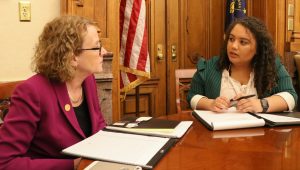The policies that are affecting the everyday lives of Hoosiers are being passed and denied at the Indiana Statehouse, and Assistant Professor of Political Science and Assistant Director for Fellowship in the Honors College Laura Merrifield Wilson said that most students on campus should be interested in public policies and pay attention to their state government. Wilson provided an opportunity for students at the University of Indianapolis to see how their government functions, inviting any willing participants and requiring one of her classes to visit the statehouse for a day.
Although a similar trip has occurred in years past, this was the first time it was integrated into curriculum. Wilson said she was excited to be able to provide students with an experience outside of the classroom to learn.

“I think that should be most students on campus [caring about public policy] because state governments [are] really influential at an individual size,” Wilson said. “So, much of the regulation and policies that impact us daily come from the state. They’re not the national policies that we hear so much about, yet people tend to not know as much about state government. So, this [Statehouse visit] was giving them the taste of government but from a probably, different perspective than they’re used to, as many students had never actually been to the state legislature, despite some of them being long, life-long Hoosiers.”
Students in Wilson’s public policy class were able to take a trip to the Indiana State House on Feb. 13. Wilson said that overall, the trip was meant for the students to talk about legislation, see committees discussing legislation and provide the students with an opportunity to experience state government beyond what is in textbooks and lectures. Before visiting, the students in the class had to choose a bill that is being voted on in the state legislature to follow throughout the course. They also had to contact the representative who was related to their bill and meet with them during the visit to contribute to a reflection and final paper. As for students that volunteered, they were allowed to come to get the same experience of real-life legislation viewing and were not obligated to do follow-up work.
Senior operations and supply chain management double major Tanner Gray is a student in Wilson’s class and decided to track the liveable wage, or minimum wage bill. Gray said that while he did not have the chance to meet with his legislature, he enjoyed the trip because of the sights. He was able to sit in an upper level of the House of Chambers, originally reserved for legislators.
Gray said that seeing the workers in the building brought the political aspect “down to earth” for him. He said he has never been much into politics, but seeing the representatives walking around and talking to students helped him realize that they are normal people as well, which was his take away from the trip.
“I felt like I was going to be the guy that had no idea what was going on, but I got there and seeing everything happen, it was a really great experience,” Gray said.
The purpose of sophomore political science major Dani Merlo’s visit was to meet with a senator for Wilson’s class. The representative she had planned to meet with was the author of the Indiana Lifeline Law, currently the bill is used for alcohol usage protection if someone is calling to save a life. Merlo said she was unable to meet with her senator because there were other bills that were being read that day. However, the trip provided her with aspirations towards her future graduate school plans, Merlo said.
“It was really cool to see them doing their job in the Statehouse and seeing that I could potentially do that someday and be involved first-hand,” Merlo said. “That was really cool.”
Wilson takes a trip similar to this with students every two years, in association with the Independent Colleges of Indiana. Wilson said this year was enhanced in comparison to years past because it was incorporated as part of the curriculum. It was a trip that they had to make for a grade, but also gave students a real look inside where the representatives work, especially those who sat in the electives’ seats, Wilson said.
Both Gray and Merlo said they are planning on talking with their representative to get a direct explanation of their chosen bills. Wilson said the class ends in April, around the same time that the bills session ends, so the assignments fit the class and adds a real application aspect to their paper over public policy.
“Some of them [bills] will pass and they will be signed into law, and some of them will fail,” Wilson said. “So it’s kind of fun for them as they select topics in January to trace, how does it do? Does it become a bill, does it not? And kind of analyzing it that way.”






